|
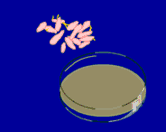 Step 1
Step 1
Use the growth medium to grow new copies of the
Clostridium tetani bacteria.
|
|
With a toxoid vaccine, the goal is to condition the
immune system to combat not an invading virus or
bacteria but rather a toxin produced by that
invading virus or bacteria. The tetanus shot is such
a vaccine. Tetanus is a disease caused by toxins
created by the bacteria Clostridium tetani.
The vaccine conditions the body's immune system to
eliminate these toxins.
To produce the vaccine, you first need to grow many
copies of the
Clostridium tetani bacteria.
|
|
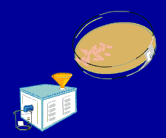 Step 2
Step 2
Isolate the toxins with the purifier.
|
|
While in the growth medium, the bacterial cells
produce the toxin, which are toxic molecules that
are often released by the cells.
To produce the vaccine, you'll need to separate
these molecules from the bacteria and the growth
medium.
|
|
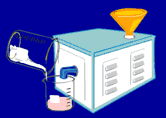 Step 3
Step 3
Add aluminum salts to the purified toxins.
|
|
In this state, the toxin would be harmful to the
human body. To make the vaccine, it needs to be
neutralized.
Sometimes formaldehyde is used to neutralize toxins.
For your vaccine, you'll use aluminum salts to
decrease its harmful effects.
|
|
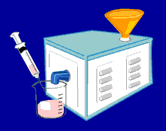 Step 4
Step 4
Fill the syringe with the treated toxins.
|
|
The toxin would work as a vaccine now, but it
wouldn't stimulate a strong immune response. To
increase the response, an "adjuvant" is added to the
vaccine.
For the tetanus vaccine, another vaccine acts as the
adjuvant. This other vaccine inoculates against
pertussis. The vaccine for diphtheria—also a
toxoid vaccine—is also often added to the
tetanus/pertussis combo, making for the DPT
vaccine.
|
|
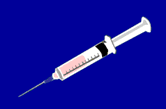 Done
Done
The tetanus vaccine is complete.
Select another pathogen.
|
|
Congratulations. You have produced a toxoid vaccine
for tetanus.
As with other inactivated vaccines, there are
disadvantages with toxoid vaccines. Even with the
adjuvant, these vaccines do not produce a full
immune response. Booster shots are needed to
maintain the immunity.
|
|